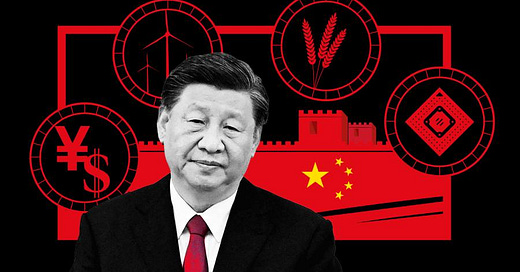Xi Jinping Wants to Turn China Into a Fortress to Conquer World Leadership by 2049.
A fortress built on 4 pillars. The clash with America will be merciless in the years to come.
The 20th Congress of the Communist Party of China ended with the consecration of the absolute power of Xi Jinping, now General Secretary for life and supported by six loyal members of the Standing Committee of the Political Bureau. The concentration of all power in Xi Jinping's hands is inseparable from his plan to transform China into a fortress to con…
Keep reading with a 7-day free trial
Subscribe to Sylvain Saurel’s Newsletter to keep reading this post and get 7 days of free access to the full post archives.




